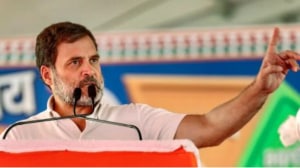No tears as India ends MIT contract
A much-hyped research collaboration between the Government and Massachusetts Institute of Technology (MIT) has ended, with both sides taking...

A much-hyped research collaboration between the Government and Massachusetts Institute of Technology (MIT) has ended, with both sides taking potshots at each other.
MIT claims it walked out due to differences with Communications and IT Minister Arun Shourie, as reports in the international media quoting Media Lab’s US chairman Nicholas Negroponte indicate. Shourie, however, has said MIT’s cavalier attitude was responsible for ending the agreement to jointly run Media Lab Asia. The projects under it, he said, would continue with the guidance of scientists at the IITs.
Media Lab Asia was started in 2001 to help develop technologies for the economically weaker sections, with affordable wireless and Net technology that could offer everything from low-cost computers to online medical and matrimonial services.
MIT today said there were differences with Shourie over focus and management of research projects. A senior Media Lab scientist Walter R Bender claimed Shourie was making changes in the way research was being conducted.
‘‘The bottomline is the minister wanted to run it like other programmes,’’ Bender said. ‘‘That’s not the way the Media Lab works. The Media Lab bets on people, not on products.’’
The minister, Negroponte alleged, does not believe in rural development through ICT (Information and Communications Technology) and is even less interested in basic innovation. Reacting sharply to Negroponte’s comments, Shourie told The Indian Express: ‘‘We called off the contract with them and informed them that we would not renew it beyond March 31. Why they have suddenly decided to raise the issue on May 9, I don’t know.’’
‘‘We gained nothing from the tie-up which was expected to help carry out research in a non-governmental atmosphere and bring in private investment,’’ he says. ‘‘But nothing of the sort happened and, in fact, IIT professors were in any case doing all the work.’’
The initial arrangement called for the Indian government to provide 20 per cent of Media Lab Asia’s funding, with corporate sponsors providing the rest.
Commenting on the statement that MIT was pulling out due to differences with him, Shourie said, “I can only compliment Mr Negroponte on his sense of humour”. “If you read Wired magazine, he spends a lot of time in Greece and Switzerland. So flying between Greece, Switzerland and Boston, he is so interested in the rural development of India and those of us sitting here are not. Obviously it’s a joke”, he said.
Putting the break-up behind them, Shourie and Human Resource Development Minister Murli Manohar Joshi will jointly work out a new role for the organisation.
‘‘Almost 10 days ago, we had referred the matter to the Cabinet for a decision but due to the involvement of the IITs, Mr Joshi wanted a discussion on the project first,’’ Shourie said. ‘‘I was more than happy to do so and very soon I will meet Joshiji to decide the road ahead,’’ he added.
As far as the IITs are concerned, MIT may be out but the digital mandi created by IIT Kanpur will continue to byte. And a Mumbai lab will continue to design bicycle computers to collect and deliver bits to rural homes where the Internet cannot reach.
News of MIT’s exit from Media Lab Asia is no surprise at its regional laboratories on IIT campuses in Mumbai, Kharagpur, Kanpur, New Delhi and Chennai. And there is no dismay.
‘‘Benefits of the MIT connection were not realised. It was cost-heavy and sponsorship was not arriving as fast as expected,’’ Dr Krithi Ramamritham, head of the regional lab at IIT Powai, told The Indian Express. The Mumbai team is busy developing sensors to test the quality of water and software for Indian language interfaces.
Just what Shourie also said. ‘‘In one project the entire contribution of MIT were two e-mails sent by them and in the other they wanted some guest lectures to be arranged for some visiting professors,’’ he said.
Shourie also objected to the salaries of the Media Lab top brass which ran into lakhs of rupees per month. ‘‘If the Government has to be involved, the salaries have to be at par with other sections of the Government and these were way out of line,’’ Shourie said. The top brass is now on notice and will have to quit Media Lab Asia.
At a recent meeting of IIT researchers, a common view was expressed that the IITs could go it alone in projects. ‘‘Except for joint discussions in the initial phase, we had no technical guidance worth mentioning from MIT. As IIT researchers, we are always eager to collaborate with universities. But if it’s Indian money, it must be on Indian terms. I am not at all disappointed with MIT’s pullout,’’ Anupam Basu, Media Lab head at IIT Kharagpur told The Indian Express.
The IIT Kharagpur media lab’s communication tools for children with cerebral palsy have been deployed at the Indian Institute of Cerebral Palsy. Work on off-line Internet access for rural schools is moving toward field tests. MIT’s exit is not a big change, Basu insists. ‘‘We understand our country and our people better.’’
Ashok Kolaskar, member of the Media Lab Asia’s Technical Advisory Group (TAG) and Vice-Chancellor Pune University, said all that would be missed is the ‘‘peer pressure’’ from MIT.
‘‘There will be no major difference because in all research projects the contribution was 90 per cent Indian. It’s not a big deal that way. The MIT innovation was to convert existing problems to technological problems and find solutions. The only question we can ask is whether we would have taken up so many projects without their collaboration?’’
Putting up the digital show — digital villages, music, hisaab, Info Sculpture, a wireless digital Gangetic Plain between Kanpur and Lucknow — will go on. ‘‘Our work will continue in full swing because as far as research goes, the MIT made no difference. They brought the culture of collaboration to India and that was helpful, but we can sustain it without direct interaction,’’ says Ramamritham.
- 01
- 02
- 03
- 04
- 05































